Federation University HRM 2 Report: Penalty Rates and Hospitality
VerifiedAdded on 2022/09/07
|11
|3407
|34
Report
AI Summary
This report analyzes the impact of penalty rate changes on the hospitality industry, focusing on HR planning, job design, and the quality of work practices. It explores how changes in legal environmental factors, specifically penalty rates, affect the industry's human resource management strategies. The report examines how these changes influence staffing levels, job roles, and employee satisfaction. It also investigates the implications of penalty rate adjustments on business operations, including trading hours and service offerings. Furthermore, the report provides recommendations for industry bodies to address the challenges and leverage the opportunities presented by these changes. It examines the implications for employees, employers, and the overall efficiency and effectiveness of the hospitality sector. The report also discusses the role of HRM in navigating these changes, ensuring compliance, and fostering a positive work environment.

HRM
Paraphrase This Document
Need a fresh take? Get an instant paraphrase of this document with our AI Paraphraser
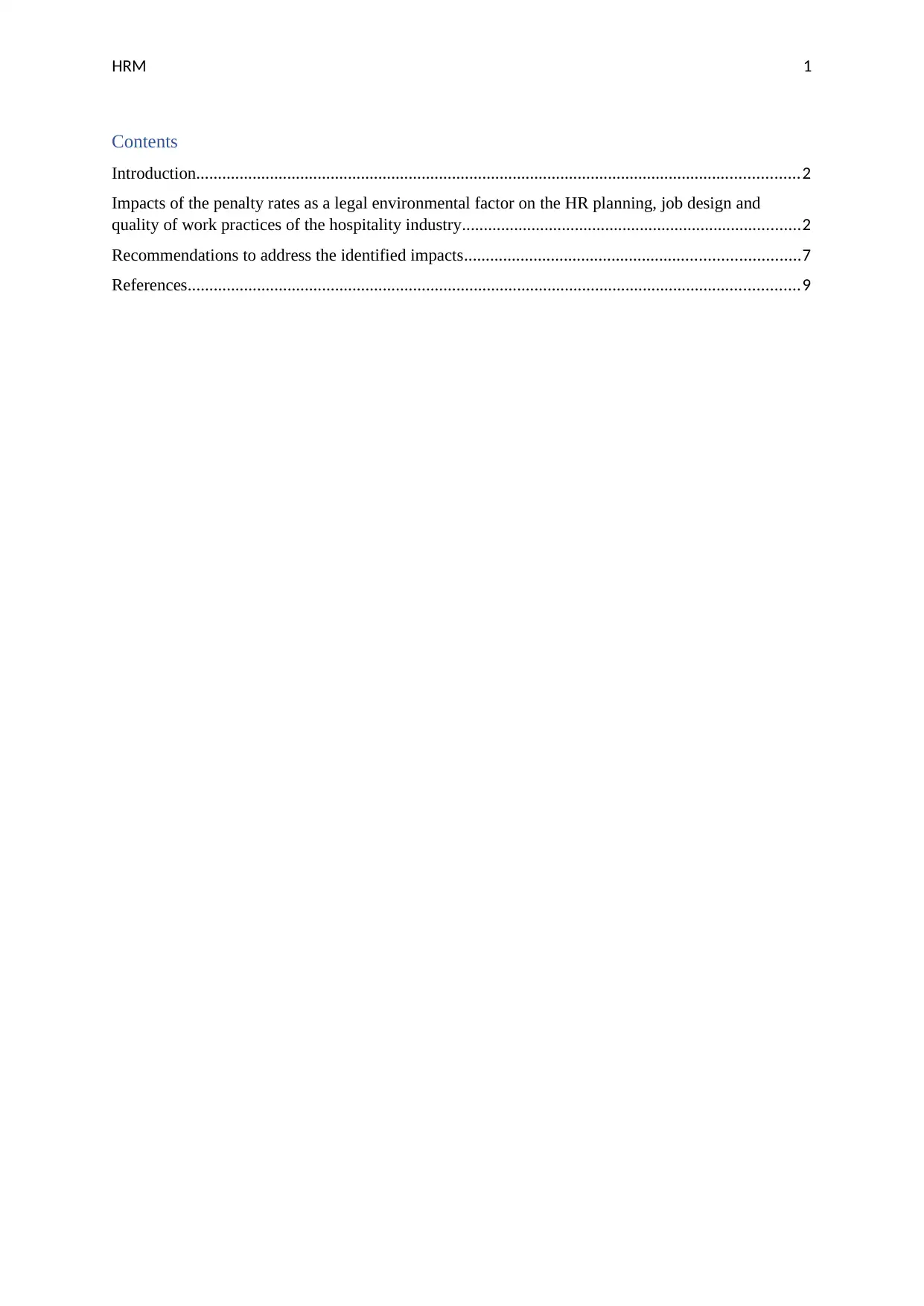
HRM 1
Contents
Introduction...........................................................................................................................................2
Impacts of the penalty rates as a legal environmental factor on the HR planning, job design and
quality of work practices of the hospitality industry..............................................................................2
Recommendations to address the identified impacts.............................................................................7
References.............................................................................................................................................9
Contents
Introduction...........................................................................................................................................2
Impacts of the penalty rates as a legal environmental factor on the HR planning, job design and
quality of work practices of the hospitality industry..............................................................................2
Recommendations to address the identified impacts.............................................................................7
References.............................................................................................................................................9
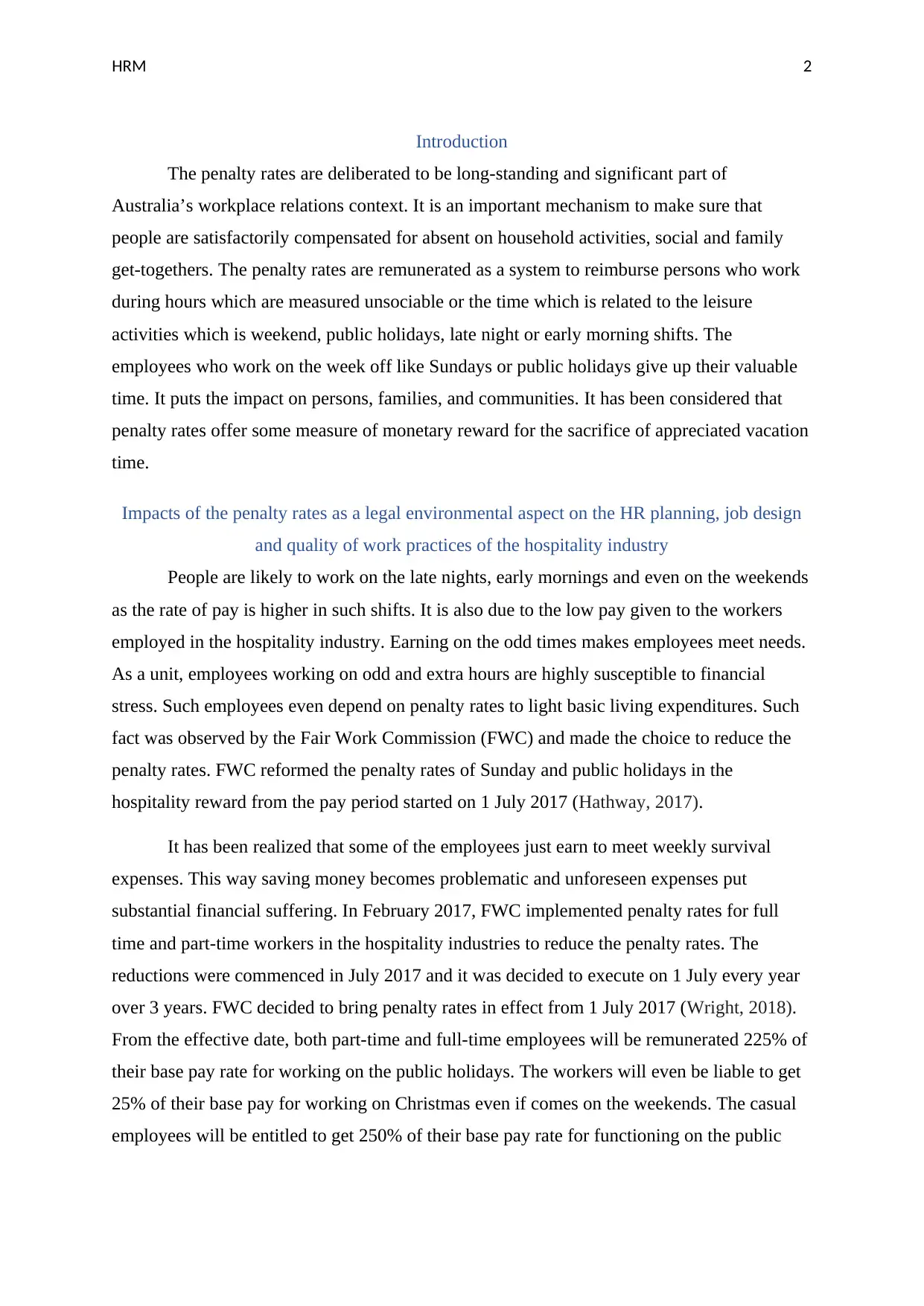
HRM 2
Introduction
The penalty rates are deliberated to be long-standing and significant part of
Australia’s workplace relations context. It is an important mechanism to make sure that
people are satisfactorily compensated for absent on household activities, social and family
get-togethers. The penalty rates are remunerated as a system to reimburse persons who work
during hours which are measured unsociable or the time which is related to the leisure
activities which is weekend, public holidays, late night or early morning shifts. The
employees who work on the week off like Sundays or public holidays give up their valuable
time. It puts the impact on persons, families, and communities. It has been considered that
penalty rates offer some measure of monetary reward for the sacrifice of appreciated vacation
time.
Impacts of the penalty rates as a legal environmental aspect on the HR planning, job design
and quality of work practices of the hospitality industry
People are likely to work on the late nights, early mornings and even on the weekends
as the rate of pay is higher in such shifts. It is also due to the low pay given to the workers
employed in the hospitality industry. Earning on the odd times makes employees meet needs.
As a unit, employees working on odd and extra hours are highly susceptible to financial
stress. Such employees even depend on penalty rates to light basic living expenditures. Such
fact was observed by the Fair Work Commission (FWC) and made the choice to reduce the
penalty rates. FWC reformed the penalty rates of Sunday and public holidays in the
hospitality reward from the pay period started on 1 July 2017 (Hathway, 2017).
It has been realized that some of the employees just earn to meet weekly survival
expenses. This way saving money becomes problematic and unforeseen expenses put
substantial financial suffering. In February 2017, FWC implemented penalty rates for full
time and part-time workers in the hospitality industries to reduce the penalty rates. The
reductions were commenced in July 2017 and it was decided to execute on 1 July every year
over 3 years. FWC decided to bring penalty rates in effect from 1 July 2017 (Wright, 2018).
From the effective date, both part-time and full-time employees will be remunerated 225% of
their base pay rate for working on the public holidays. The workers will even be liable to get
25% of their base pay for working on Christmas even if comes on the weekends. The casual
employees will be entitled to get 250% of their base pay rate for functioning on the public
Introduction
The penalty rates are deliberated to be long-standing and significant part of
Australia’s workplace relations context. It is an important mechanism to make sure that
people are satisfactorily compensated for absent on household activities, social and family
get-togethers. The penalty rates are remunerated as a system to reimburse persons who work
during hours which are measured unsociable or the time which is related to the leisure
activities which is weekend, public holidays, late night or early morning shifts. The
employees who work on the week off like Sundays or public holidays give up their valuable
time. It puts the impact on persons, families, and communities. It has been considered that
penalty rates offer some measure of monetary reward for the sacrifice of appreciated vacation
time.
Impacts of the penalty rates as a legal environmental aspect on the HR planning, job design
and quality of work practices of the hospitality industry
People are likely to work on the late nights, early mornings and even on the weekends
as the rate of pay is higher in such shifts. It is also due to the low pay given to the workers
employed in the hospitality industry. Earning on the odd times makes employees meet needs.
As a unit, employees working on odd and extra hours are highly susceptible to financial
stress. Such employees even depend on penalty rates to light basic living expenditures. Such
fact was observed by the Fair Work Commission (FWC) and made the choice to reduce the
penalty rates. FWC reformed the penalty rates of Sunday and public holidays in the
hospitality reward from the pay period started on 1 July 2017 (Hathway, 2017).
It has been realized that some of the employees just earn to meet weekly survival
expenses. This way saving money becomes problematic and unforeseen expenses put
substantial financial suffering. In February 2017, FWC implemented penalty rates for full
time and part-time workers in the hospitality industries to reduce the penalty rates. The
reductions were commenced in July 2017 and it was decided to execute on 1 July every year
over 3 years. FWC decided to bring penalty rates in effect from 1 July 2017 (Wright, 2018).
From the effective date, both part-time and full-time employees will be remunerated 225% of
their base pay rate for working on the public holidays. The workers will even be liable to get
25% of their base pay for working on Christmas even if comes on the weekends. The casual
employees will be entitled to get 250% of their base pay rate for functioning on the public
⊘ This is a preview!⊘
Do you want full access?
Subscribe today to unlock all pages.

Trusted by 1+ million students worldwide
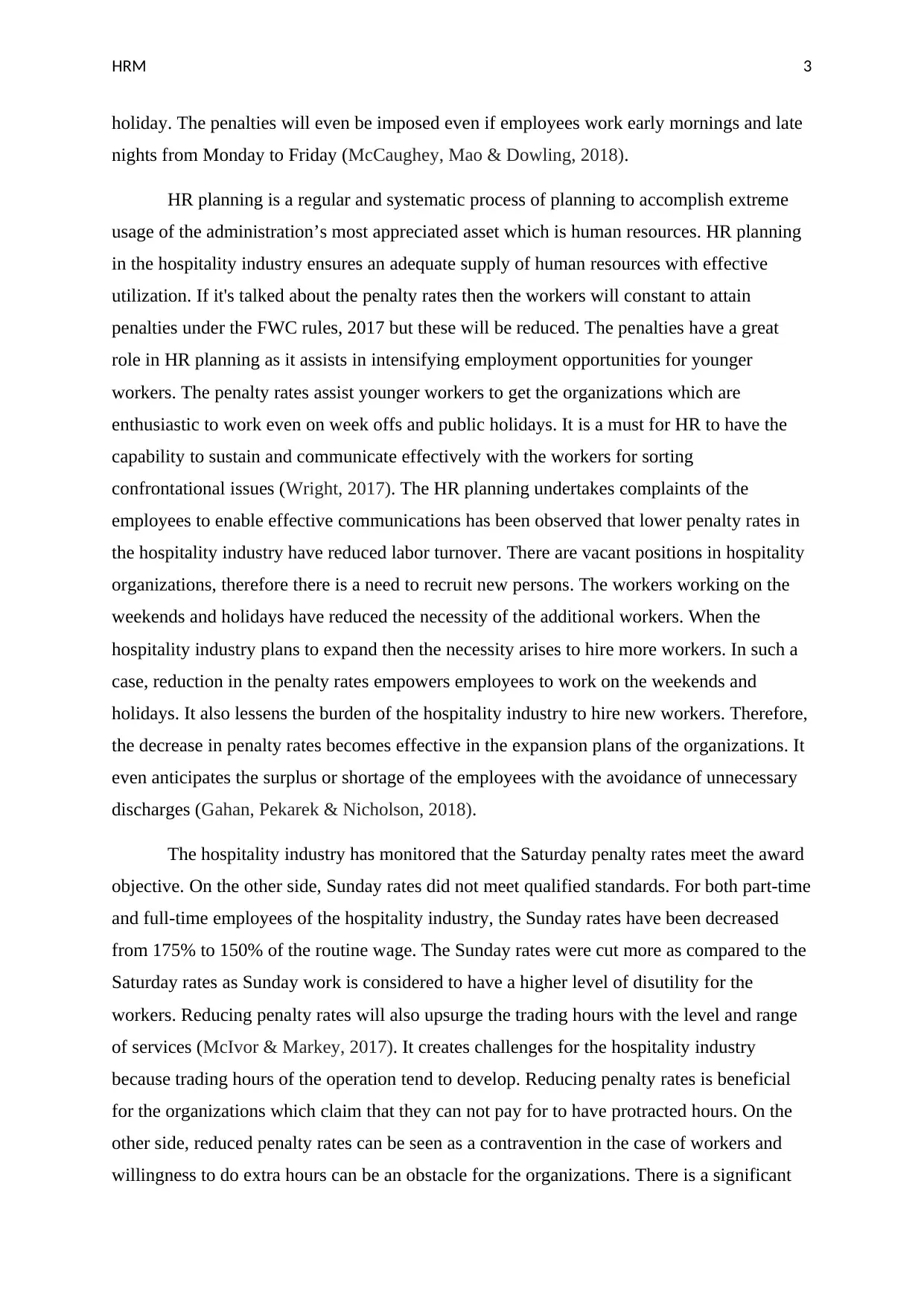
HRM 3
holiday. The penalties will even be imposed even if employees work early mornings and late
nights from Monday to Friday (McCaughey, Mao & Dowling, 2018).
HR planning is a regular and systematic process of planning to accomplish extreme
usage of the administration’s most appreciated asset which is human resources. HR planning
in the hospitality industry ensures an adequate supply of human resources with effective
utilization. If it's talked about the penalty rates then the workers will constant to attain
penalties under the FWC rules, 2017 but these will be reduced. The penalties have a great
role in HR planning as it assists in intensifying employment opportunities for younger
workers. The penalty rates assist younger workers to get the organizations which are
enthusiastic to work even on week offs and public holidays. It is a must for HR to have the
capability to sustain and communicate effectively with the workers for sorting
confrontational issues (Wright, 2017). The HR planning undertakes complaints of the
employees to enable effective communications has been observed that lower penalty rates in
the hospitality industry have reduced labor turnover. There are vacant positions in hospitality
organizations, therefore there is a need to recruit new persons. The workers working on the
weekends and holidays have reduced the necessity of the additional workers. When the
hospitality industry plans to expand then the necessity arises to hire more workers. In such a
case, reduction in the penalty rates empowers employees to work on the weekends and
holidays. It also lessens the burden of the hospitality industry to hire new workers. Therefore,
the decrease in penalty rates becomes effective in the expansion plans of the organizations. It
even anticipates the surplus or shortage of the employees with the avoidance of unnecessary
discharges (Gahan, Pekarek & Nicholson, 2018).
The hospitality industry has monitored that the Saturday penalty rates meet the award
objective. On the other side, Sunday rates did not meet qualified standards. For both part-time
and full-time employees of the hospitality industry, the Sunday rates have been decreased
from 175% to 150% of the routine wage. The Sunday rates were cut more as compared to the
Saturday rates as Sunday work is considered to have a higher level of disutility for the
workers. Reducing penalty rates will also upsurge the trading hours with the level and range
of services (McIvor & Markey, 2017). It creates challenges for the hospitality industry
because trading hours of the operation tend to develop. Reducing penalty rates is beneficial
for the organizations which claim that they can not pay for to have protracted hours. On the
other side, reduced penalty rates can be seen as a contravention in the case of workers and
willingness to do extra hours can be an obstacle for the organizations. There is a significant
holiday. The penalties will even be imposed even if employees work early mornings and late
nights from Monday to Friday (McCaughey, Mao & Dowling, 2018).
HR planning is a regular and systematic process of planning to accomplish extreme
usage of the administration’s most appreciated asset which is human resources. HR planning
in the hospitality industry ensures an adequate supply of human resources with effective
utilization. If it's talked about the penalty rates then the workers will constant to attain
penalties under the FWC rules, 2017 but these will be reduced. The penalties have a great
role in HR planning as it assists in intensifying employment opportunities for younger
workers. The penalty rates assist younger workers to get the organizations which are
enthusiastic to work even on week offs and public holidays. It is a must for HR to have the
capability to sustain and communicate effectively with the workers for sorting
confrontational issues (Wright, 2017). The HR planning undertakes complaints of the
employees to enable effective communications has been observed that lower penalty rates in
the hospitality industry have reduced labor turnover. There are vacant positions in hospitality
organizations, therefore there is a need to recruit new persons. The workers working on the
weekends and holidays have reduced the necessity of the additional workers. When the
hospitality industry plans to expand then the necessity arises to hire more workers. In such a
case, reduction in the penalty rates empowers employees to work on the weekends and
holidays. It also lessens the burden of the hospitality industry to hire new workers. Therefore,
the decrease in penalty rates becomes effective in the expansion plans of the organizations. It
even anticipates the surplus or shortage of the employees with the avoidance of unnecessary
discharges (Gahan, Pekarek & Nicholson, 2018).
The hospitality industry has monitored that the Saturday penalty rates meet the award
objective. On the other side, Sunday rates did not meet qualified standards. For both part-time
and full-time employees of the hospitality industry, the Sunday rates have been decreased
from 175% to 150% of the routine wage. The Sunday rates were cut more as compared to the
Saturday rates as Sunday work is considered to have a higher level of disutility for the
workers. Reducing penalty rates will also upsurge the trading hours with the level and range
of services (McIvor & Markey, 2017). It creates challenges for the hospitality industry
because trading hours of the operation tend to develop. Reducing penalty rates is beneficial
for the organizations which claim that they can not pay for to have protracted hours. On the
other side, reduced penalty rates can be seen as a contravention in the case of workers and
willingness to do extra hours can be an obstacle for the organizations. There is a significant
Paraphrase This Document
Need a fresh take? Get an instant paraphrase of this document with our AI Paraphraser
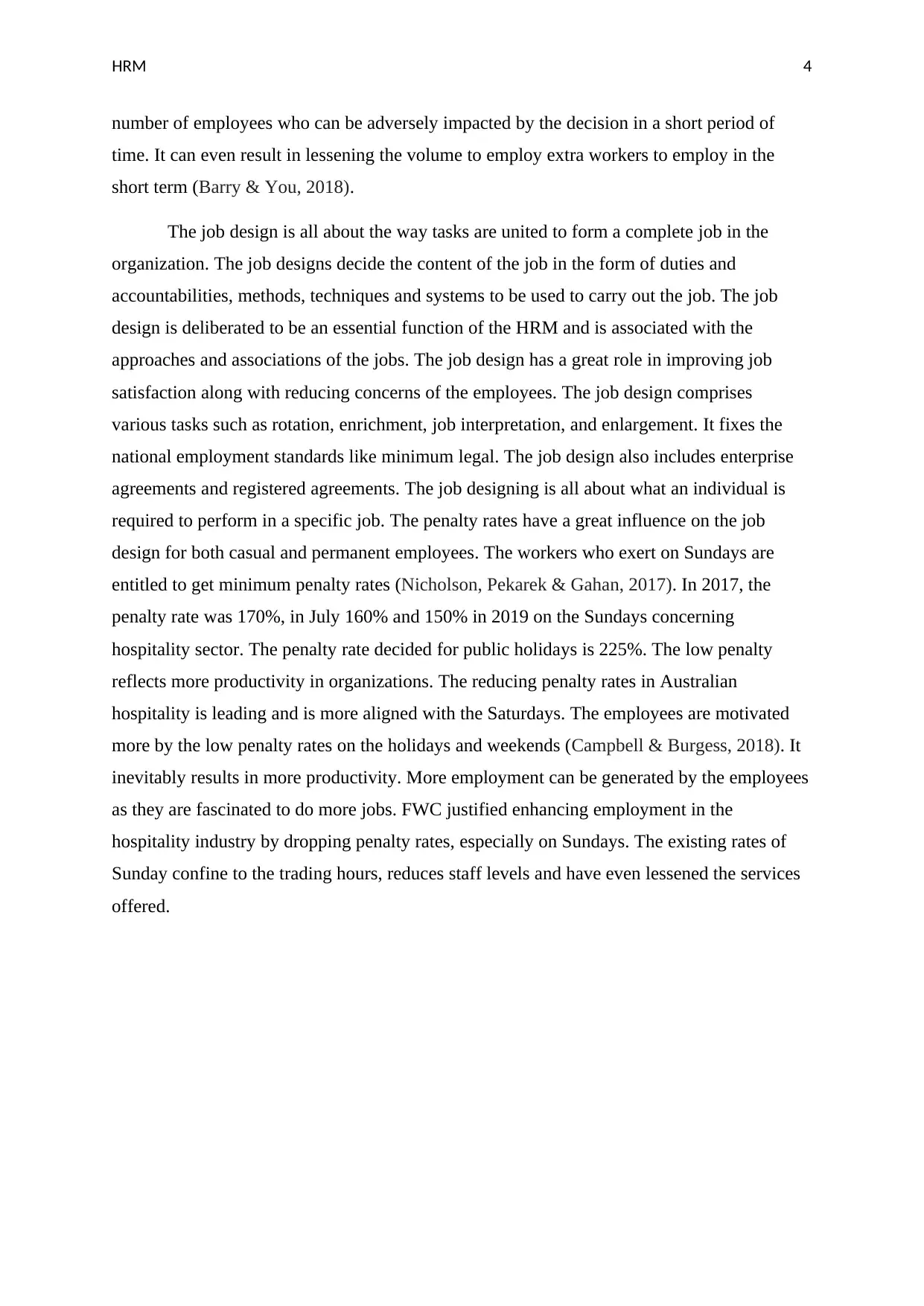
HRM 4
number of employees who can be adversely impacted by the decision in a short period of
time. It can even result in lessening the volume to employ extra workers to employ in the
short term (Barry & You, 2018).
The job design is all about the way tasks are united to form a complete job in the
organization. The job designs decide the content of the job in the form of duties and
accountabilities, methods, techniques and systems to be used to carry out the job. The job
design is deliberated to be an essential function of the HRM and is associated with the
approaches and associations of the jobs. The job design has a great role in improving job
satisfaction along with reducing concerns of the employees. The job design comprises
various tasks such as rotation, enrichment, job interpretation, and enlargement. It fixes the
national employment standards like minimum legal. The job design also includes enterprise
agreements and registered agreements. The job designing is all about what an individual is
required to perform in a specific job. The penalty rates have a great influence on the job
design for both casual and permanent employees. The workers who exert on Sundays are
entitled to get minimum penalty rates (Nicholson, Pekarek & Gahan, 2017). In 2017, the
penalty rate was 170%, in July 160% and 150% in 2019 on the Sundays concerning
hospitality sector. The penalty rate decided for public holidays is 225%. The low penalty
reflects more productivity in organizations. The reducing penalty rates in Australian
hospitality is leading and is more aligned with the Saturdays. The employees are motivated
more by the low penalty rates on the holidays and weekends (Campbell & Burgess, 2018). It
inevitably results in more productivity. More employment can be generated by the employees
as they are fascinated to do more jobs. FWC justified enhancing employment in the
hospitality industry by dropping penalty rates, especially on Sundays. The existing rates of
Sunday confine to the trading hours, reduces staff levels and have even lessened the services
offered.
number of employees who can be adversely impacted by the decision in a short period of
time. It can even result in lessening the volume to employ extra workers to employ in the
short term (Barry & You, 2018).
The job design is all about the way tasks are united to form a complete job in the
organization. The job designs decide the content of the job in the form of duties and
accountabilities, methods, techniques and systems to be used to carry out the job. The job
design is deliberated to be an essential function of the HRM and is associated with the
approaches and associations of the jobs. The job design has a great role in improving job
satisfaction along with reducing concerns of the employees. The job design comprises
various tasks such as rotation, enrichment, job interpretation, and enlargement. It fixes the
national employment standards like minimum legal. The job design also includes enterprise
agreements and registered agreements. The job designing is all about what an individual is
required to perform in a specific job. The penalty rates have a great influence on the job
design for both casual and permanent employees. The workers who exert on Sundays are
entitled to get minimum penalty rates (Nicholson, Pekarek & Gahan, 2017). In 2017, the
penalty rate was 170%, in July 160% and 150% in 2019 on the Sundays concerning
hospitality sector. The penalty rate decided for public holidays is 225%. The low penalty
reflects more productivity in organizations. The reducing penalty rates in Australian
hospitality is leading and is more aligned with the Saturdays. The employees are motivated
more by the low penalty rates on the holidays and weekends (Campbell & Burgess, 2018). It
inevitably results in more productivity. More employment can be generated by the employees
as they are fascinated to do more jobs. FWC justified enhancing employment in the
hospitality industry by dropping penalty rates, especially on Sundays. The existing rates of
Sunday confine to the trading hours, reduces staff levels and have even lessened the services
offered.
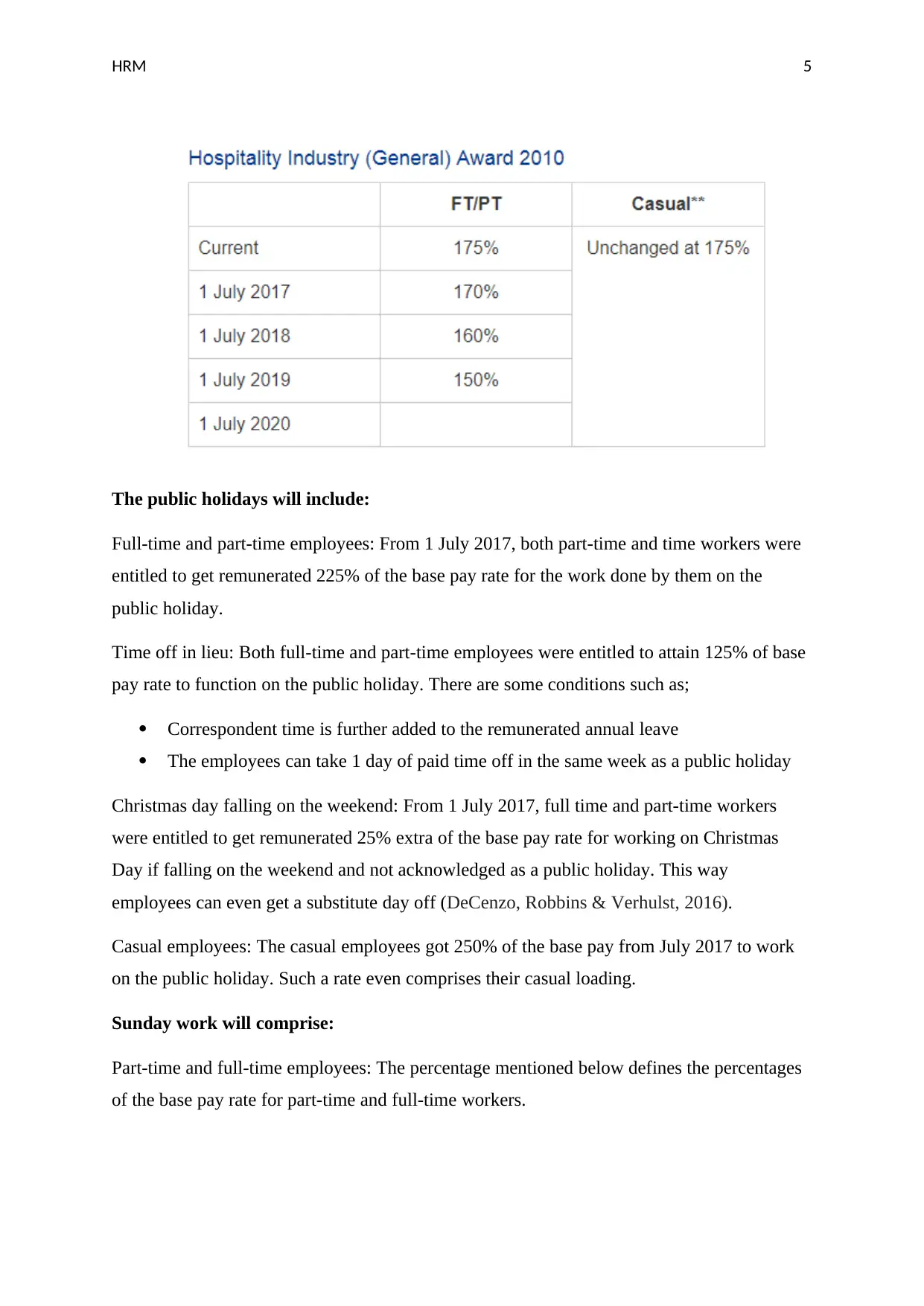
HRM 5
The public holidays will include:
Full-time and part-time employees: From 1 July 2017, both part-time and time workers were
entitled to get remunerated 225% of the base pay rate for the work done by them on the
public holiday.
Time off in lieu: Both full-time and part-time employees were entitled to attain 125% of base
pay rate to function on the public holiday. There are some conditions such as;
Correspondent time is further added to the remunerated annual leave
The employees can take 1 day of paid time off in the same week as a public holiday
Christmas day falling on the weekend: From 1 July 2017, full time and part-time workers
were entitled to get remunerated 25% extra of the base pay rate for working on Christmas
Day if falling on the weekend and not acknowledged as a public holiday. This way
employees can even get a substitute day off (DeCenzo, Robbins & Verhulst, 2016).
Casual employees: The casual employees got 250% of the base pay from July 2017 to work
on the public holiday. Such a rate even comprises their casual loading.
Sunday work will comprise:
Part-time and full-time employees: The percentage mentioned below defines the percentages
of the base pay rate for part-time and full-time workers.
The public holidays will include:
Full-time and part-time employees: From 1 July 2017, both part-time and time workers were
entitled to get remunerated 225% of the base pay rate for the work done by them on the
public holiday.
Time off in lieu: Both full-time and part-time employees were entitled to attain 125% of base
pay rate to function on the public holiday. There are some conditions such as;
Correspondent time is further added to the remunerated annual leave
The employees can take 1 day of paid time off in the same week as a public holiday
Christmas day falling on the weekend: From 1 July 2017, full time and part-time workers
were entitled to get remunerated 25% extra of the base pay rate for working on Christmas
Day if falling on the weekend and not acknowledged as a public holiday. This way
employees can even get a substitute day off (DeCenzo, Robbins & Verhulst, 2016).
Casual employees: The casual employees got 250% of the base pay from July 2017 to work
on the public holiday. Such a rate even comprises their casual loading.
Sunday work will comprise:
Part-time and full-time employees: The percentage mentioned below defines the percentages
of the base pay rate for part-time and full-time workers.
⊘ This is a preview!⊘
Do you want full access?
Subscribe today to unlock all pages.

Trusted by 1+ million students worldwide
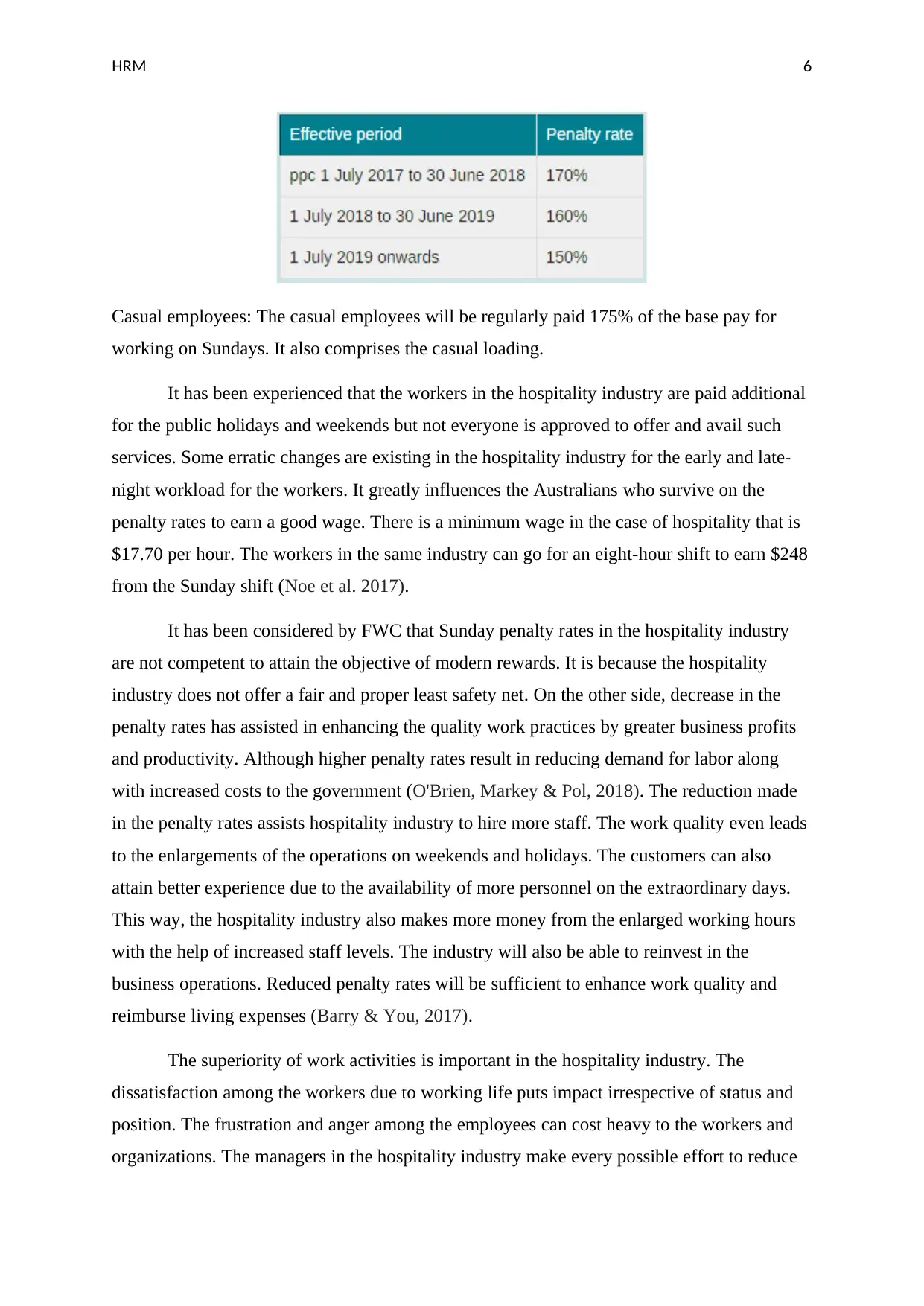
HRM 6
Casual employees: The casual employees will be regularly paid 175% of the base pay for
working on Sundays. It also comprises the casual loading.
It has been experienced that the workers in the hospitality industry are paid additional
for the public holidays and weekends but not everyone is approved to offer and avail such
services. Some erratic changes are existing in the hospitality industry for the early and late-
night workload for the workers. It greatly influences the Australians who survive on the
penalty rates to earn a good wage. There is a minimum wage in the case of hospitality that is
$17.70 per hour. The workers in the same industry can go for an eight-hour shift to earn $248
from the Sunday shift (Noe et al. 2017).
It has been considered by FWC that Sunday penalty rates in the hospitality industry
are not competent to attain the objective of modern rewards. It is because the hospitality
industry does not offer a fair and proper least safety net. On the other side, decrease in the
penalty rates has assisted in enhancing the quality work practices by greater business profits
and productivity. Although higher penalty rates result in reducing demand for labor along
with increased costs to the government (O'Brien, Markey & Pol, 2018). The reduction made
in the penalty rates assists hospitality industry to hire more staff. The work quality even leads
to the enlargements of the operations on weekends and holidays. The customers can also
attain better experience due to the availability of more personnel on the extraordinary days.
This way, the hospitality industry also makes more money from the enlarged working hours
with the help of increased staff levels. The industry will also be able to reinvest in the
business operations. Reduced penalty rates will be sufficient to enhance work quality and
reimburse living expenses (Barry & You, 2017).
The superiority of work activities is important in the hospitality industry. The
dissatisfaction among the workers due to working life puts impact irrespective of status and
position. The frustration and anger among the employees can cost heavy to the workers and
organizations. The managers in the hospitality industry make every possible effort to reduce
Casual employees: The casual employees will be regularly paid 175% of the base pay for
working on Sundays. It also comprises the casual loading.
It has been experienced that the workers in the hospitality industry are paid additional
for the public holidays and weekends but not everyone is approved to offer and avail such
services. Some erratic changes are existing in the hospitality industry for the early and late-
night workload for the workers. It greatly influences the Australians who survive on the
penalty rates to earn a good wage. There is a minimum wage in the case of hospitality that is
$17.70 per hour. The workers in the same industry can go for an eight-hour shift to earn $248
from the Sunday shift (Noe et al. 2017).
It has been considered by FWC that Sunday penalty rates in the hospitality industry
are not competent to attain the objective of modern rewards. It is because the hospitality
industry does not offer a fair and proper least safety net. On the other side, decrease in the
penalty rates has assisted in enhancing the quality work practices by greater business profits
and productivity. Although higher penalty rates result in reducing demand for labor along
with increased costs to the government (O'Brien, Markey & Pol, 2018). The reduction made
in the penalty rates assists hospitality industry to hire more staff. The work quality even leads
to the enlargements of the operations on weekends and holidays. The customers can also
attain better experience due to the availability of more personnel on the extraordinary days.
This way, the hospitality industry also makes more money from the enlarged working hours
with the help of increased staff levels. The industry will also be able to reinvest in the
business operations. Reduced penalty rates will be sufficient to enhance work quality and
reimburse living expenses (Barry & You, 2017).
The superiority of work activities is important in the hospitality industry. The
dissatisfaction among the workers due to working life puts impact irrespective of status and
position. The frustration and anger among the employees can cost heavy to the workers and
organizations. The managers in the hospitality industry make every possible effort to reduce
Paraphrase This Document
Need a fresh take? Get an instant paraphrase of this document with our AI Paraphraser
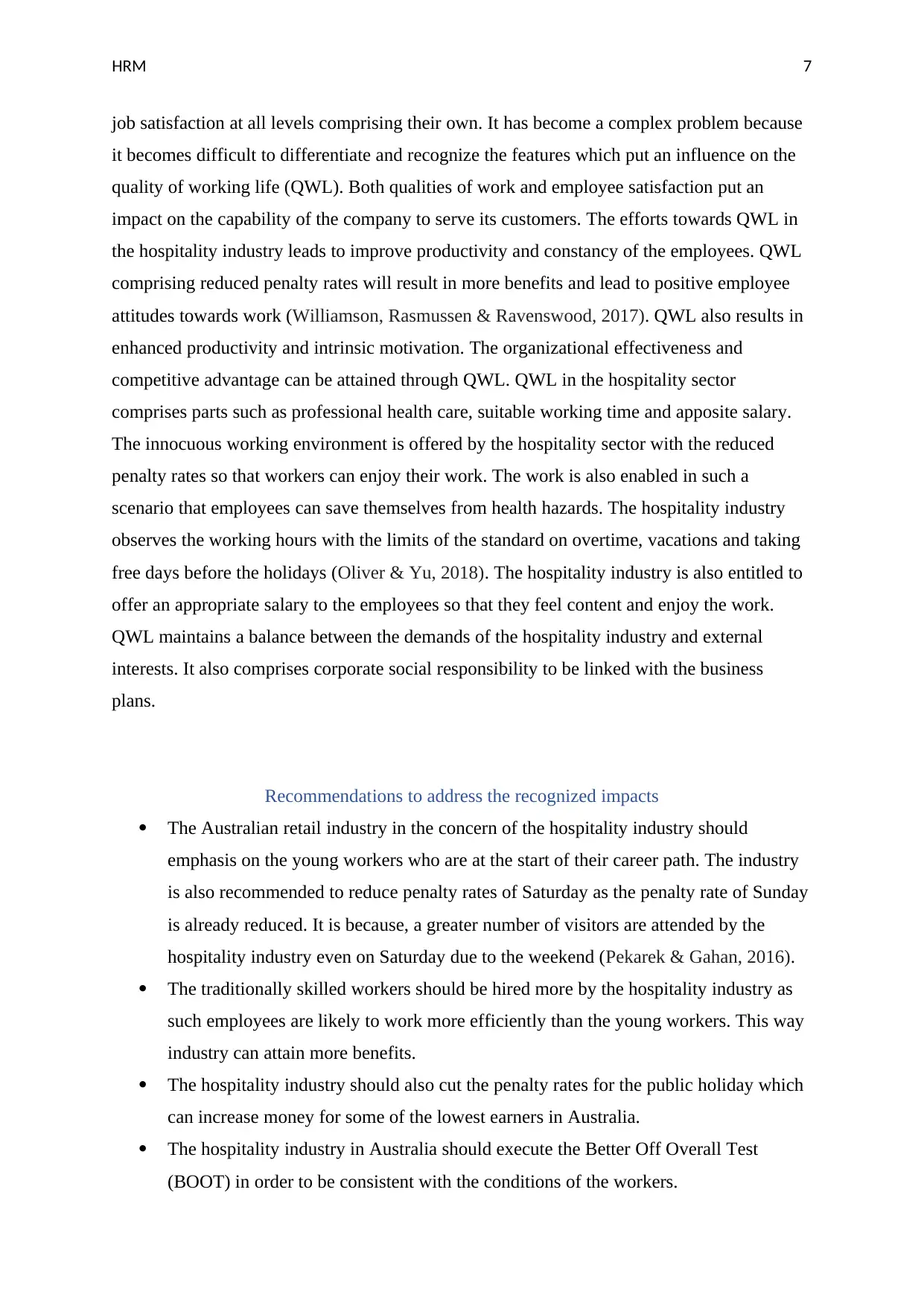
HRM 7
job satisfaction at all levels comprising their own. It has become a complex problem because
it becomes difficult to differentiate and recognize the features which put an influence on the
quality of working life (QWL). Both qualities of work and employee satisfaction put an
impact on the capability of the company to serve its customers. The efforts towards QWL in
the hospitality industry leads to improve productivity and constancy of the employees. QWL
comprising reduced penalty rates will result in more benefits and lead to positive employee
attitudes towards work (Williamson, Rasmussen & Ravenswood, 2017). QWL also results in
enhanced productivity and intrinsic motivation. The organizational effectiveness and
competitive advantage can be attained through QWL. QWL in the hospitality sector
comprises parts such as professional health care, suitable working time and apposite salary.
The innocuous working environment is offered by the hospitality sector with the reduced
penalty rates so that workers can enjoy their work. The work is also enabled in such a
scenario that employees can save themselves from health hazards. The hospitality industry
observes the working hours with the limits of the standard on overtime, vacations and taking
free days before the holidays (Oliver & Yu, 2018). The hospitality industry is also entitled to
offer an appropriate salary to the employees so that they feel content and enjoy the work.
QWL maintains a balance between the demands of the hospitality industry and external
interests. It also comprises corporate social responsibility to be linked with the business
plans.
Recommendations to address the recognized impacts
The Australian retail industry in the concern of the hospitality industry should
emphasis on the young workers who are at the start of their career path. The industry
is also recommended to reduce penalty rates of Saturday as the penalty rate of Sunday
is already reduced. It is because, a greater number of visitors are attended by the
hospitality industry even on Saturday due to the weekend (Pekarek & Gahan, 2016).
The traditionally skilled workers should be hired more by the hospitality industry as
such employees are likely to work more efficiently than the young workers. This way
industry can attain more benefits.
The hospitality industry should also cut the penalty rates for the public holiday which
can increase money for some of the lowest earners in Australia.
The hospitality industry in Australia should execute the Better Off Overall Test
(BOOT) in order to be consistent with the conditions of the workers.
job satisfaction at all levels comprising their own. It has become a complex problem because
it becomes difficult to differentiate and recognize the features which put an influence on the
quality of working life (QWL). Both qualities of work and employee satisfaction put an
impact on the capability of the company to serve its customers. The efforts towards QWL in
the hospitality industry leads to improve productivity and constancy of the employees. QWL
comprising reduced penalty rates will result in more benefits and lead to positive employee
attitudes towards work (Williamson, Rasmussen & Ravenswood, 2017). QWL also results in
enhanced productivity and intrinsic motivation. The organizational effectiveness and
competitive advantage can be attained through QWL. QWL in the hospitality sector
comprises parts such as professional health care, suitable working time and apposite salary.
The innocuous working environment is offered by the hospitality sector with the reduced
penalty rates so that workers can enjoy their work. The work is also enabled in such a
scenario that employees can save themselves from health hazards. The hospitality industry
observes the working hours with the limits of the standard on overtime, vacations and taking
free days before the holidays (Oliver & Yu, 2018). The hospitality industry is also entitled to
offer an appropriate salary to the employees so that they feel content and enjoy the work.
QWL maintains a balance between the demands of the hospitality industry and external
interests. It also comprises corporate social responsibility to be linked with the business
plans.
Recommendations to address the recognized impacts
The Australian retail industry in the concern of the hospitality industry should
emphasis on the young workers who are at the start of their career path. The industry
is also recommended to reduce penalty rates of Saturday as the penalty rate of Sunday
is already reduced. It is because, a greater number of visitors are attended by the
hospitality industry even on Saturday due to the weekend (Pekarek & Gahan, 2016).
The traditionally skilled workers should be hired more by the hospitality industry as
such employees are likely to work more efficiently than the young workers. This way
industry can attain more benefits.
The hospitality industry should also cut the penalty rates for the public holiday which
can increase money for some of the lowest earners in Australia.
The hospitality industry in Australia should execute the Better Off Overall Test
(BOOT) in order to be consistent with the conditions of the workers.
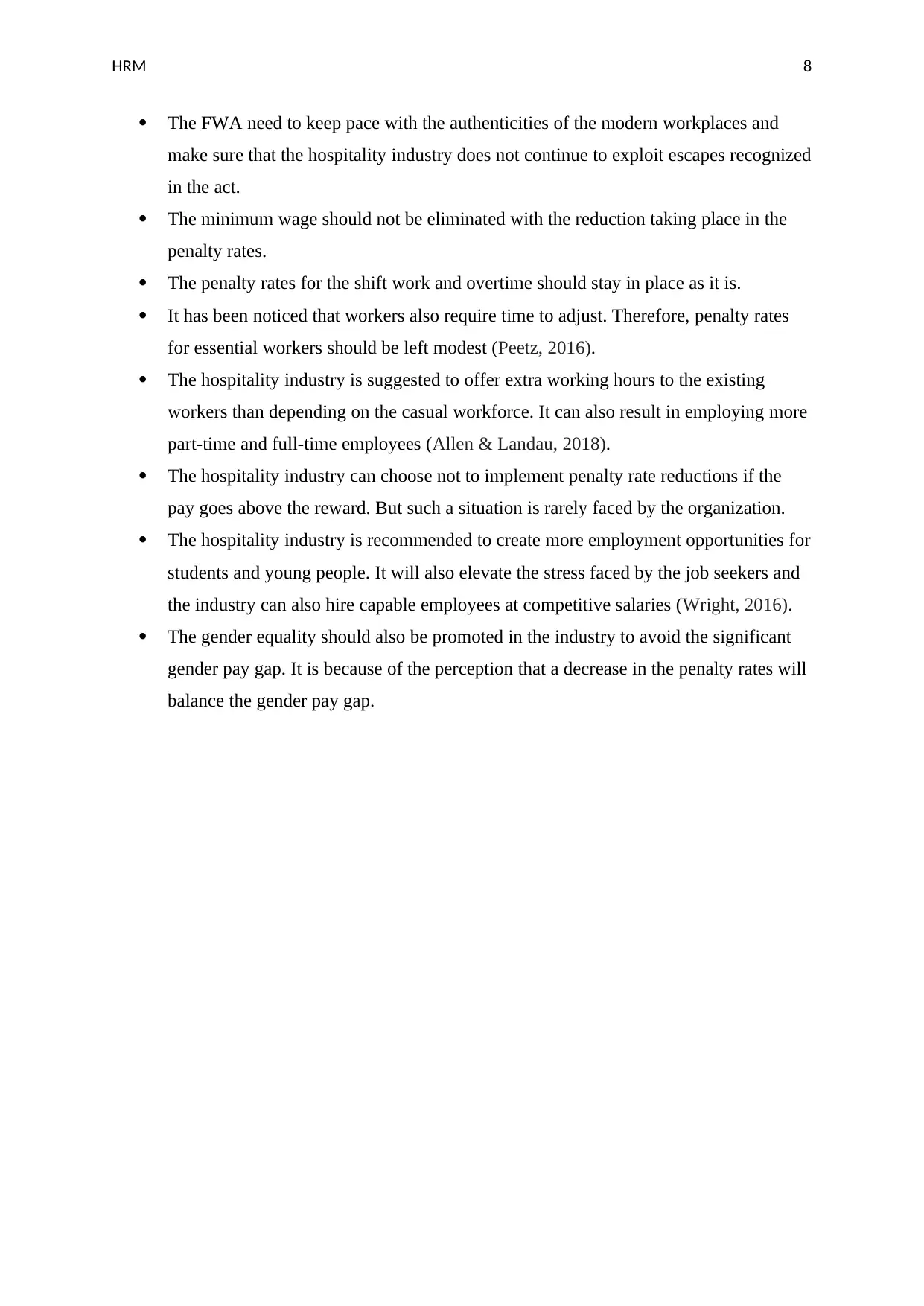
HRM 8
The FWA need to keep pace with the authenticities of the modern workplaces and
make sure that the hospitality industry does not continue to exploit escapes recognized
in the act.
The minimum wage should not be eliminated with the reduction taking place in the
penalty rates.
The penalty rates for the shift work and overtime should stay in place as it is.
It has been noticed that workers also require time to adjust. Therefore, penalty rates
for essential workers should be left modest (Peetz, 2016).
The hospitality industry is suggested to offer extra working hours to the existing
workers than depending on the casual workforce. It can also result in employing more
part-time and full-time employees (Allen & Landau, 2018).
The hospitality industry can choose not to implement penalty rate reductions if the
pay goes above the reward. But such a situation is rarely faced by the organization.
The hospitality industry is recommended to create more employment opportunities for
students and young people. It will also elevate the stress faced by the job seekers and
the industry can also hire capable employees at competitive salaries (Wright, 2016).
The gender equality should also be promoted in the industry to avoid the significant
gender pay gap. It is because of the perception that a decrease in the penalty rates will
balance the gender pay gap.
The FWA need to keep pace with the authenticities of the modern workplaces and
make sure that the hospitality industry does not continue to exploit escapes recognized
in the act.
The minimum wage should not be eliminated with the reduction taking place in the
penalty rates.
The penalty rates for the shift work and overtime should stay in place as it is.
It has been noticed that workers also require time to adjust. Therefore, penalty rates
for essential workers should be left modest (Peetz, 2016).
The hospitality industry is suggested to offer extra working hours to the existing
workers than depending on the casual workforce. It can also result in employing more
part-time and full-time employees (Allen & Landau, 2018).
The hospitality industry can choose not to implement penalty rate reductions if the
pay goes above the reward. But such a situation is rarely faced by the organization.
The hospitality industry is recommended to create more employment opportunities for
students and young people. It will also elevate the stress faced by the job seekers and
the industry can also hire capable employees at competitive salaries (Wright, 2016).
The gender equality should also be promoted in the industry to avoid the significant
gender pay gap. It is because of the perception that a decrease in the penalty rates will
balance the gender pay gap.
⊘ This is a preview!⊘
Do you want full access?
Subscribe today to unlock all pages.

Trusted by 1+ million students worldwide
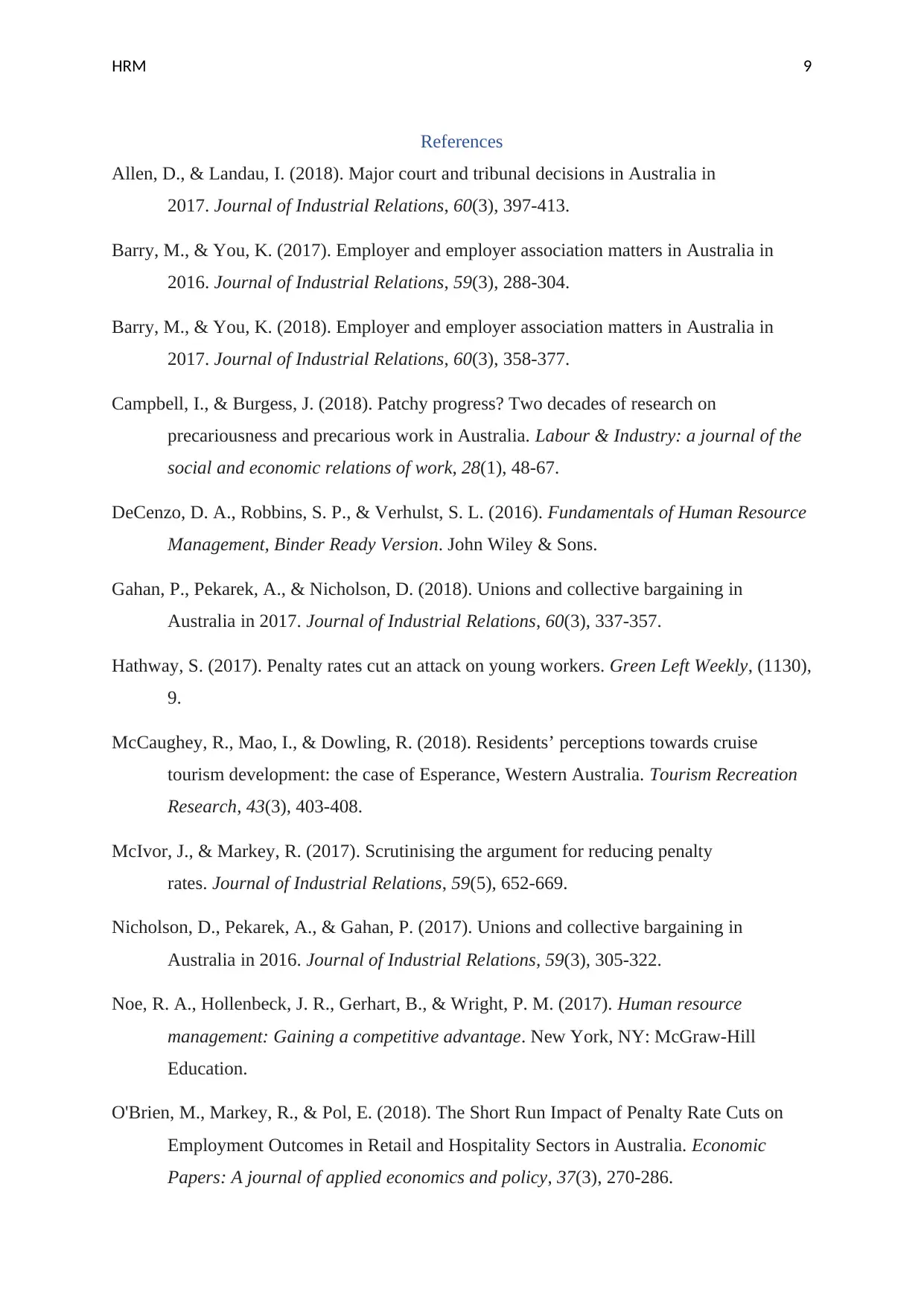
HRM 9
References
Allen, D., & Landau, I. (2018). Major court and tribunal decisions in Australia in
2017. Journal of Industrial Relations, 60(3), 397-413.
Barry, M., & You, K. (2017). Employer and employer association matters in Australia in
2016. Journal of Industrial Relations, 59(3), 288-304.
Barry, M., & You, K. (2018). Employer and employer association matters in Australia in
2017. Journal of Industrial Relations, 60(3), 358-377.
Campbell, I., & Burgess, J. (2018). Patchy progress? Two decades of research on
precariousness and precarious work in Australia. Labour & Industry: a journal of the
social and economic relations of work, 28(1), 48-67.
DeCenzo, D. A., Robbins, S. P., & Verhulst, S. L. (2016). Fundamentals of Human Resource
Management, Binder Ready Version. John Wiley & Sons.
Gahan, P., Pekarek, A., & Nicholson, D. (2018). Unions and collective bargaining in
Australia in 2017. Journal of Industrial Relations, 60(3), 337-357.
Hathway, S. (2017). Penalty rates cut an attack on young workers. Green Left Weekly, (1130),
9.
McCaughey, R., Mao, I., & Dowling, R. (2018). Residents’ perceptions towards cruise
tourism development: the case of Esperance, Western Australia. Tourism Recreation
Research, 43(3), 403-408.
McIvor, J., & Markey, R. (2017). Scrutinising the argument for reducing penalty
rates. Journal of Industrial Relations, 59(5), 652-669.
Nicholson, D., Pekarek, A., & Gahan, P. (2017). Unions and collective bargaining in
Australia in 2016. Journal of Industrial Relations, 59(3), 305-322.
Noe, R. A., Hollenbeck, J. R., Gerhart, B., & Wright, P. M. (2017). Human resource
management: Gaining a competitive advantage. New York, NY: McGraw-Hill
Education.
O'Brien, M., Markey, R., & Pol, E. (2018). The Short Run Impact of Penalty Rate Cuts on
Employment Outcomes in Retail and Hospitality Sectors in Australia. Economic
Papers: A journal of applied economics and policy, 37(3), 270-286.
References
Allen, D., & Landau, I. (2018). Major court and tribunal decisions in Australia in
2017. Journal of Industrial Relations, 60(3), 397-413.
Barry, M., & You, K. (2017). Employer and employer association matters in Australia in
2016. Journal of Industrial Relations, 59(3), 288-304.
Barry, M., & You, K. (2018). Employer and employer association matters in Australia in
2017. Journal of Industrial Relations, 60(3), 358-377.
Campbell, I., & Burgess, J. (2018). Patchy progress? Two decades of research on
precariousness and precarious work in Australia. Labour & Industry: a journal of the
social and economic relations of work, 28(1), 48-67.
DeCenzo, D. A., Robbins, S. P., & Verhulst, S. L. (2016). Fundamentals of Human Resource
Management, Binder Ready Version. John Wiley & Sons.
Gahan, P., Pekarek, A., & Nicholson, D. (2018). Unions and collective bargaining in
Australia in 2017. Journal of Industrial Relations, 60(3), 337-357.
Hathway, S. (2017). Penalty rates cut an attack on young workers. Green Left Weekly, (1130),
9.
McCaughey, R., Mao, I., & Dowling, R. (2018). Residents’ perceptions towards cruise
tourism development: the case of Esperance, Western Australia. Tourism Recreation
Research, 43(3), 403-408.
McIvor, J., & Markey, R. (2017). Scrutinising the argument for reducing penalty
rates. Journal of Industrial Relations, 59(5), 652-669.
Nicholson, D., Pekarek, A., & Gahan, P. (2017). Unions and collective bargaining in
Australia in 2016. Journal of Industrial Relations, 59(3), 305-322.
Noe, R. A., Hollenbeck, J. R., Gerhart, B., & Wright, P. M. (2017). Human resource
management: Gaining a competitive advantage. New York, NY: McGraw-Hill
Education.
O'Brien, M., Markey, R., & Pol, E. (2018). The Short Run Impact of Penalty Rate Cuts on
Employment Outcomes in Retail and Hospitality Sectors in Australia. Economic
Papers: A journal of applied economics and policy, 37(3), 270-286.
Paraphrase This Document
Need a fresh take? Get an instant paraphrase of this document with our AI Paraphraser
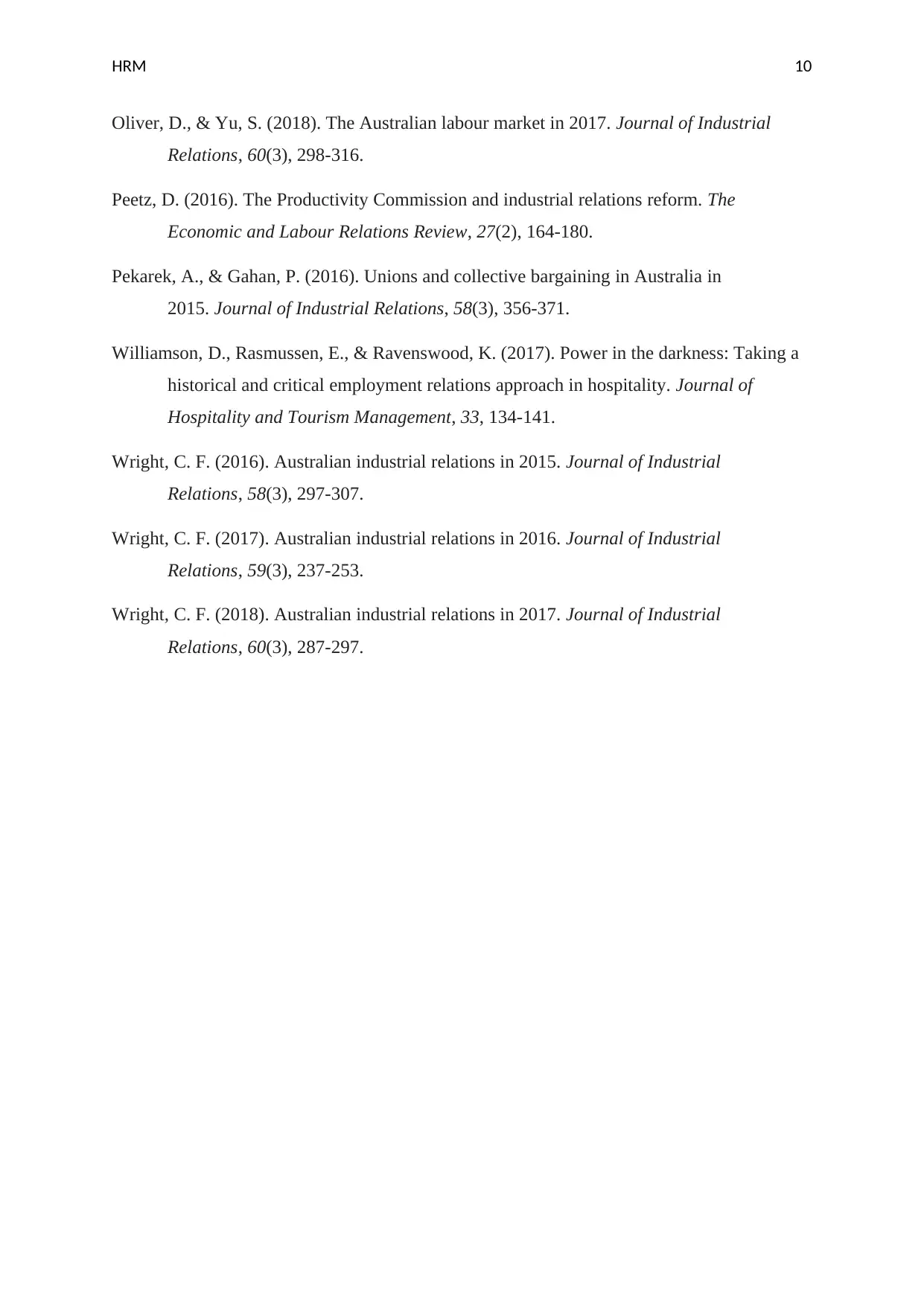
HRM 10
Oliver, D., & Yu, S. (2018). The Australian labour market in 2017. Journal of Industrial
Relations, 60(3), 298-316.
Peetz, D. (2016). The Productivity Commission and industrial relations reform. The
Economic and Labour Relations Review, 27(2), 164-180.
Pekarek, A., & Gahan, P. (2016). Unions and collective bargaining in Australia in
2015. Journal of Industrial Relations, 58(3), 356-371.
Williamson, D., Rasmussen, E., & Ravenswood, K. (2017). Power in the darkness: Taking a
historical and critical employment relations approach in hospitality. Journal of
Hospitality and Tourism Management, 33, 134-141.
Wright, C. F. (2016). Australian industrial relations in 2015. Journal of Industrial
Relations, 58(3), 297-307.
Wright, C. F. (2017). Australian industrial relations in 2016. Journal of Industrial
Relations, 59(3), 237-253.
Wright, C. F. (2018). Australian industrial relations in 2017. Journal of Industrial
Relations, 60(3), 287-297.
Oliver, D., & Yu, S. (2018). The Australian labour market in 2017. Journal of Industrial
Relations, 60(3), 298-316.
Peetz, D. (2016). The Productivity Commission and industrial relations reform. The
Economic and Labour Relations Review, 27(2), 164-180.
Pekarek, A., & Gahan, P. (2016). Unions and collective bargaining in Australia in
2015. Journal of Industrial Relations, 58(3), 356-371.
Williamson, D., Rasmussen, E., & Ravenswood, K. (2017). Power in the darkness: Taking a
historical and critical employment relations approach in hospitality. Journal of
Hospitality and Tourism Management, 33, 134-141.
Wright, C. F. (2016). Australian industrial relations in 2015. Journal of Industrial
Relations, 58(3), 297-307.
Wright, C. F. (2017). Australian industrial relations in 2016. Journal of Industrial
Relations, 59(3), 237-253.
Wright, C. F. (2018). Australian industrial relations in 2017. Journal of Industrial
Relations, 60(3), 287-297.
1 out of 11
Related Documents
Your All-in-One AI-Powered Toolkit for Academic Success.
+13062052269
info@desklib.com
Available 24*7 on WhatsApp / Email
![[object Object]](/_next/static/media/star-bottom.7253800d.svg)
Unlock your academic potential
Copyright © 2020–2026 A2Z Services. All Rights Reserved. Developed and managed by ZUCOL.





